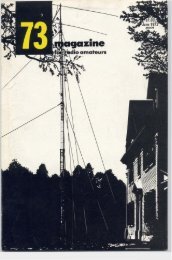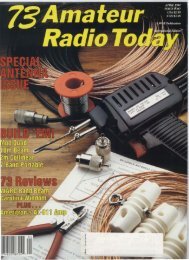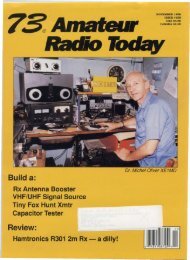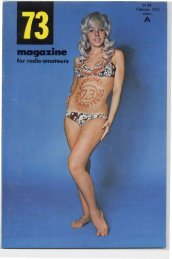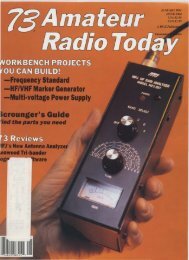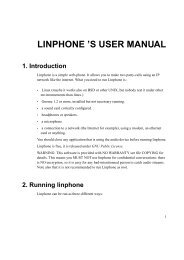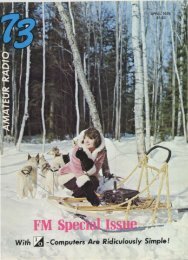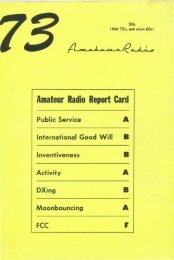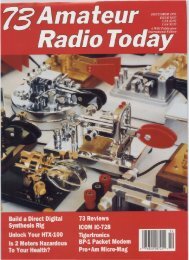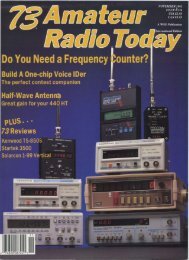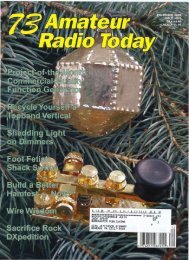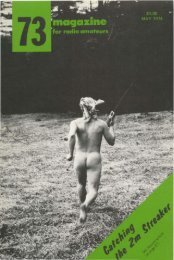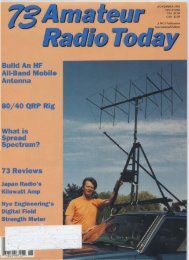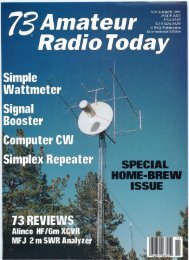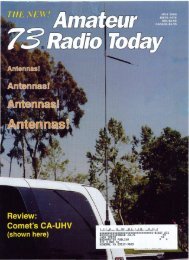rf - Free and Open Source Software
rf - Free and Open Source Software
rf - Free and Open Source Software
- No tags were found...
Create successful ePaper yourself
Turn your PDF publications into a flip-book with our unique Google optimized e-Paper software.
the 20's <strong>and</strong> 30's the phone transmitters were<br />
considerably more expensive than CW rigs<br />
<strong>and</strong> a lot more difficult to tune, with t he result<br />
that most amateur operation was via CWo<br />
But, as soon as phone was available the hams<br />
started using it <strong>and</strong> the percentage of phone<br />
ops grew steadily. Most operators preferred<br />
to talk rather than whistle <strong>and</strong> they changed<br />
to phone as soon as they co uld afford it.<br />
Sideb<strong>and</strong> completely broke the back of<br />
th e CW holdouts. Their complaints that CW<br />
could get through better than phone or that a<br />
CWrig was much less expensive th an a pho ne<br />
rig fell apart. Side b<strong>and</strong>, t hey fo und, could<br />
get through just about any time that CW<br />
co uld! And the Heath $99 SSB transceiver<br />
forever stilled co mplaints about cost.<br />
There are sti ll a sizable number of ops that<br />
use CW because they enjoy using it, but few,<br />
except Novices, use Cw out of necessity. With<br />
the percentage of CW operation dropping<br />
year by year, many have wondered just why<br />
the FCC added the 20 wp m requirement to<br />
the Extra Class license.<br />
Modern communications techniques would<br />
see m to put emphasis on things like RTTY,<br />
facsimile, slow scan television, narrow b<strong>and</strong><br />
television, ti me sharing of channels, <strong>and</strong> other<br />
developments rather than harking back to<br />
our early days <strong>and</strong> our most primative mode.<br />
The FCC, to the contrary, has been decidedly<br />
backwards in h<strong>and</strong>ing down favorable rules<br />
for RTTY, facsimile, television, etc. Amateur<br />
development of these modes has been harassed<br />
<strong>and</strong> impeded by the FCC rather than<br />
helped , as per (c).<br />
Part (d) calls for trained operators, technicians<br />
<strong>and</strong> electronic experts. We are concentrating<br />
more on trained o perators these<br />
days than technicians. But, with some<br />
10,000 of us active on the VHF's <strong>and</strong> a similar<br />
nu mber working wit h RTTY <strong>and</strong> other<br />
advanced modes of co mmunications, we are<br />
not doing too badly in the expert department.<br />
Good will? With phone contacts as simple<br />
as they arc today tens of thous<strong>and</strong>s o f OX<br />
operators can talk <strong>and</strong> make friends with fellows<br />
aU over the world. A few simpletons<br />
yelling break-break, or calling doggedly on a<br />
OX frequency can create ill will, but for the<br />
most part, ham radio is a friendly world community.<br />
A recent report of the Stanford Research<br />
organization showed that , dollar for<br />
dollar, radio amateurs achieve more good<br />
will t~an short wave broadcasting...by a large<br />
margin.<br />
We might try to curb our penchant for donating<br />
money to DXpeditions too . These<br />
often bring terrible ill will for us from ahroad.<br />
The big problem is this : since the DXer is<br />
doing the job for money . he is very apt to<br />
by-pass a lot of formalities <strong>and</strong> tread heavily<br />
on toes in order to get on the air. Onc DXer<br />
went into Jordan a few years back <strong>and</strong> went<br />
on the air without a proper lice nse. The result<br />
was that ham rad io was fin ished there<br />
from then on.<br />
All in all , when you look over the FCC basis<br />
<strong>and</strong> purpose for amateur radio, we see m<br />
to still, in spite of all the changes that have<br />
come about" be well wort h our salt. Perhaps<br />
those that are calling for a return to building<br />
should take a look at the balance sheet.<br />
My own feeling is that building equipment<br />
is a lot of fun <strong>and</strong> I intend to run every construction<br />
project in 73 that I can get my<br />
h<strong>and</strong>s on. Of course, I will tend towards<br />
pushin g the newer modes such as TV, RITY,<br />
SSTV, FAX, FM , <strong>and</strong> the like . We have a<br />
thous<strong>and</strong> or so hams that spend their hobby<br />
hours bu ilding equipment. Few of them ever<br />
get on the air for more than a sho rt test of a<br />
new unit. .. then the parts go back into the<br />
junk box <strong>and</strong> the next project is underway.<br />
These are the fellows who provide us with<br />
most of the original co nstructio ns articles...<br />
this is why yo u keep seeing the same calls<br />
over <strong>and</strong> over in 73.<br />
It is important for us to do everything we<br />
can to see that we co nstantly have new amateurs<br />
enteri ng the hobby. A certain percentage<br />
of th ese newcomers will turn out to be<br />
builders...others will go for new modes...<strong>and</strong><br />
a very few will get some sort of weird idea<br />
for a rad ical cha nge <strong>and</strong> spend years working<br />
on it...<strong>and</strong> they just might succeed. I am<br />
reasonably sure that it wo n't be long until<br />
someone makes a giga ntic breakthrough into<br />
another form of communications which will<br />
make radio obsolete. It co uld well be o ne of<br />
the Novices who will get his ticket this fall.<br />
What do you think?<br />
...Way ne<br />
Recent Visits<br />
90<br />
73 MAGAZINE



